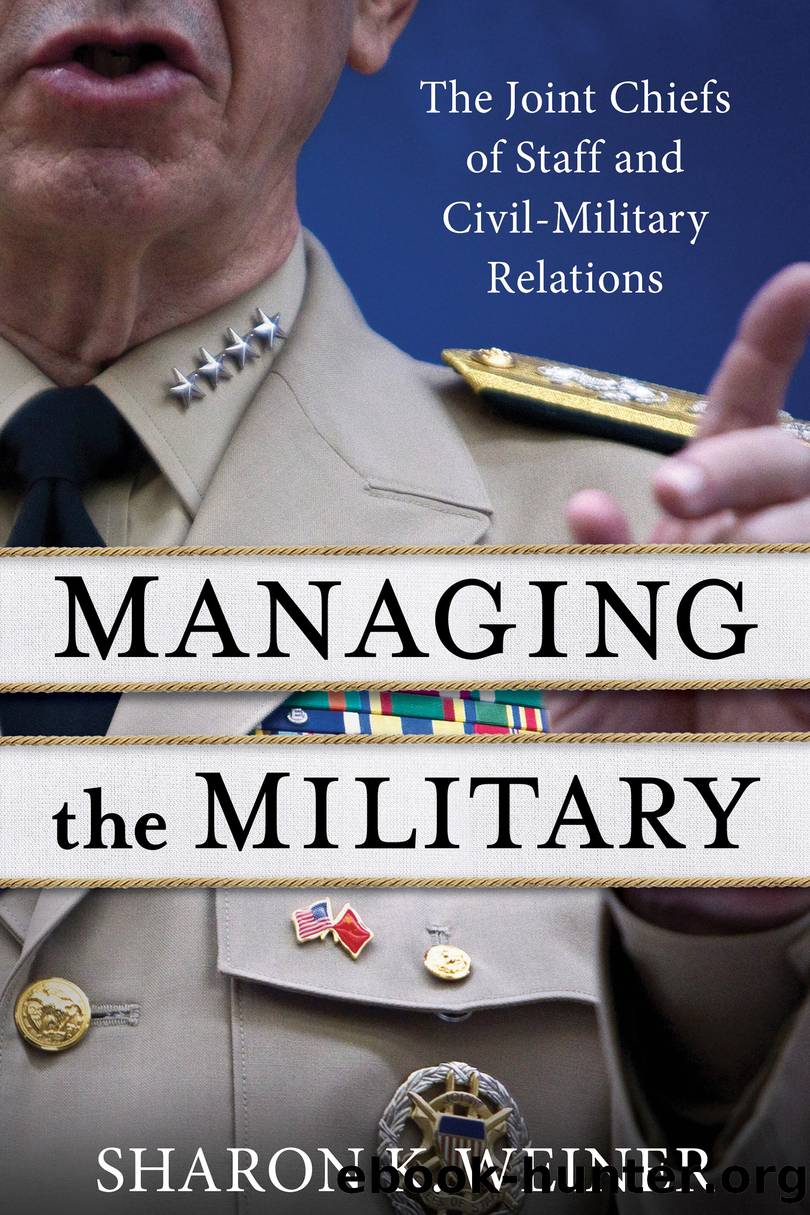Managing the Military by Sharon K. Weiner

Author:Sharon K. Weiner
Language: eng
Format: epub
Publisher: Columbia University Press
TRANSFORMATION AND CIVIL-MILITARY RELATIONS
Rumsfeldâs two attempts at transformation show the limits of civilian control. Rumsfeld arrived in the Pentagon with the full backing of President George W. Bush for his transformation agenda and lacking any inclination to be timid in asserting what he considered appropriate civilian control of the Pentagon. The presidentâs support was subsequently reiterated in the fall of 2001 and the spring of 2002 when Rumsfeld established the Office of Force Transformation. Moreover, success in Afghanistan and Iraq seemed, at least initially, to validate Rumsfeldâs argument about a smaller, more flexible mobile force.
Yet after five budgets and two QDRs, most of the serviceâs favored weapons remained. The battles Rumsfeld won, such as those concerning increased funding for missile defense and drones, were due to budget increases and supplements, not cuts to service priorities. The one exception was the army, which lost the Crusader, Comanche, and eventually the Future Combat System. But, with the exception of the Crusader, the army supported canceling or restructuring these platforms. Moreover, Rumsfeld failed to reduce the size of the army. The active-duty army was at 481,000 members when Rumsfeld arrived at the Pentagon. It was 482,000 when he left in 2006.68
Certainly, part of the failure of transformation lies with Rumsfeldâs management style. His dismissive and authoritarian tactics annoyed not only the service chiefs, but many of the career people working in the Pentagon. The service chiefs distrusted Rumsfeld and felt he was dismissive of their expertise. They were not about to unquestioningly follow his direction to eliminate many of their long-standing investment priorities.
Congress did not offer a counterweight to the unified opposition of the service chiefs. Not only did the servicesâ weapon preferences have congressional supporters, but Rumsfeld also gained more enemies when he proposed significant cuts to one of the mainstays of congressional pork: military construction projects. Some Republicans disliked him because they felt defense budgets were too low. Democrats opposed the administration in general, and especially after questions about the war in Iraq mounted. Even when the 2002 midterm elections returned control of both houses to the Republicans, Rumsfeldâs support in Congress was meager.
The chairman played a minor role in the failure of transformation. Even if Shelton had supported Rumsfeldâs agenda, in the face of opposition from the service chiefs and with only a few allies in Congress, even a politically savvy military officer would have faced an uphill battle. But Sheltonâs and Myersâs roles do provide important clues about the changed nature of civil-military relations. Like Powell before him, Sheltonâs experience makes it clear that the chairman can successfully stake out a position independent of and in contradiction to the defense secretary. Moreover, early in his tenure Shelton asserted his right to provide advice to the president independent of the secretary. In his autobiography, Shelton recounts an early exchange with the Rumsfeld:
Finally he [Rumsfeld] asked me, âHow do you view your job?â
That was easy because itâs specifically delineated by federal statute. âMr. Secretary, I am the principal military adviser to
Download
This site does not store any files on its server. We only index and link to content provided by other sites. Please contact the content providers to delete copyright contents if any and email us, we'll remove relevant links or contents immediately.
The Secret History by Donna Tartt(19094)
The Social Justice Warrior Handbook by Lisa De Pasquale(12191)
Thirteen Reasons Why by Jay Asher(8914)
This Is How You Lose Her by Junot Diaz(6890)
Weapons of Math Destruction by Cathy O'Neil(6282)
Zero to One by Peter Thiel(5804)
Beartown by Fredrik Backman(5759)
The Myth of the Strong Leader by Archie Brown(5510)
The Fire Next Time by James Baldwin(5450)
How Democracies Die by Steven Levitsky & Daniel Ziblatt(5219)
Promise Me, Dad by Joe Biden(5154)
Stone's Rules by Roger Stone(5088)
A Higher Loyalty: Truth, Lies, and Leadership by James Comey(4965)
100 Deadly Skills by Clint Emerson(4927)
Rise and Kill First by Ronen Bergman(4790)
Secrecy World by Jake Bernstein(4754)
The David Icke Guide to the Global Conspiracy (and how to end it) by David Icke(4720)
The Farm by Tom Rob Smith(4514)
The Doomsday Machine by Daniel Ellsberg(4491)
